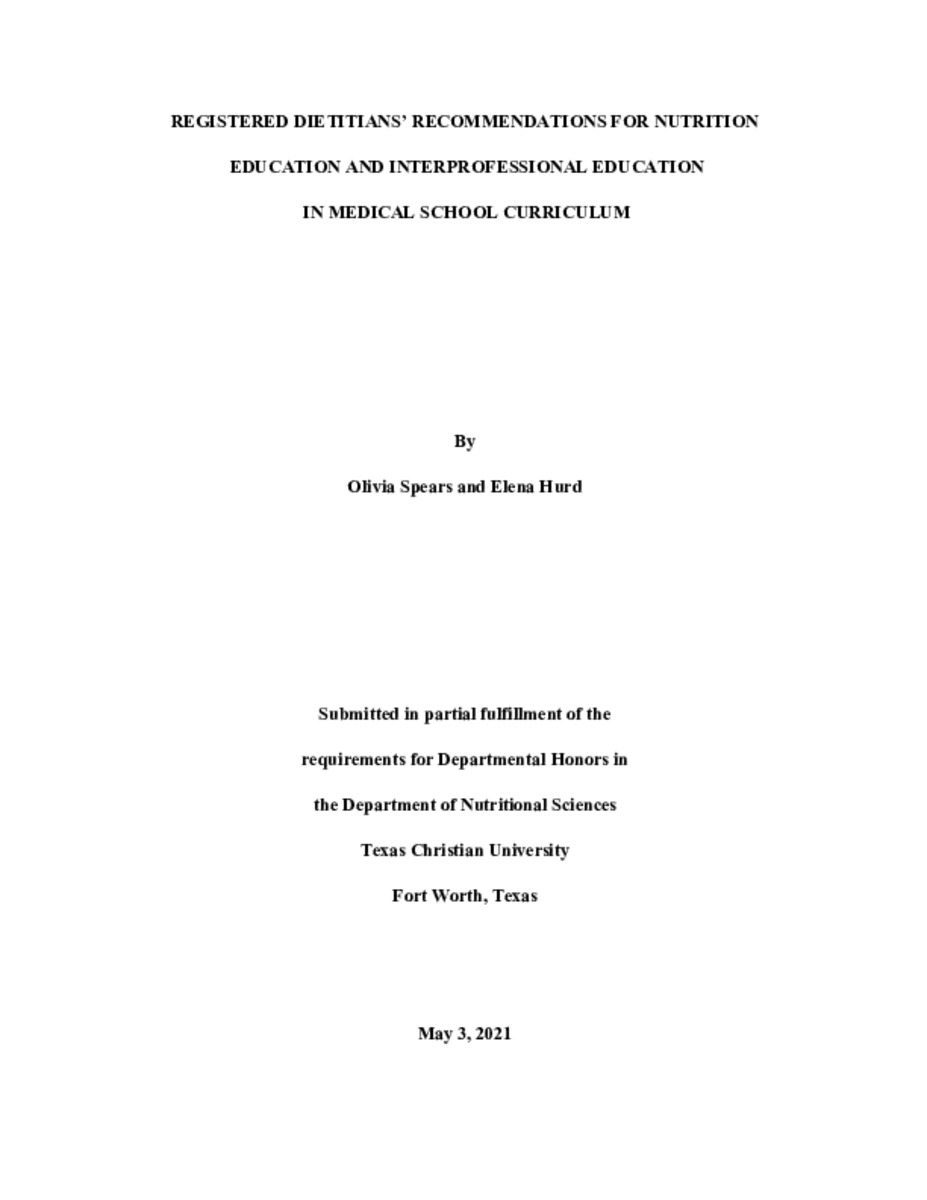Registered Dietitians' Recommendations for Nutrition Education and Interprofessional education in Medical School CurriculumShow full item record
| Title | Registered Dietitians' Recommendations for Nutrition Education and Interprofessional education in Medical School Curriculum |
|---|---|
| Author | Spears, Olivia |
| Date | 2021 |
| Abstract | Background. The prevalence of nutrition-related diseases has created a need for increased nutrition education in medical school curricula. Incorporating nutrition education into medical school programs is likely to increase physicians' ability to provide nutrition advice and increase advocacy for healthy lifestyles. Objective. The purpose of this study was two-fold: 1) to determine Registered Dietitians' (RDs) perceptions of nutrition knowledge; and 2) to determine the interprofessional practice of physicians. Methods. A 27-question electronic survey was developed and distributed to a Survey Monkey link through email, social medial and word-of-mouth communication following IRB approval. Inclusion criteria includes RD/RDNs currently credentialed with the Commission of Dietetic Registration over the age of 18 years. The investigators used Excel for Mac, Version 16.42 for all data analysis. Statistical significance was set at p<0.05. Results. The study surveys 64 RDs in Texas. Participants (n=64) were 38.3+/-11.0 and 98.4% (n=63) female. 94% (n=61) of participants reported feeling comfortable interacting with or providing nutrition information to physicians in a healthcare team setting. Approximately 30% (n=19) of participants rated physicians at expected to well above expected on establishing collaborative relationships with RDs. 78% (n=50) of participants reported that they disagreed/strongly disagreed that physicians are well-prepared to educate their patients in nutrition. 40% (n=28) agreed/strongly agreed that physicians discuss nutrition with patients/clients when appropriate. Conclusions. RDs did not report that physicians were well-prepared to educate patients about nutrition or discuss nutrition with patients when appropriate. RDs reported being comfortable interacting with physicians. The majority of participants reported that physicians meet or exceed expectations for establishing collaborative relationships. Thus, interprofessional teams are valuable in achieving positive patient outcomes. |
| Link | https://repository.tcu.edu/handle/116099117/49107 |
| Department | Nutritional Sciences |
| Advisor | Willis, Jada L. |
| Additional Date(s) | 2021-05-19 |
Files in this item
This item appears in the following Collection(s)
- Undergraduate Honors Papers [1362]
Related items
Showing a few items related by title, author, creator and subject.
-
Registered Dietitians' Recommendations for Nutrition Education and Interprofessional Education In Medical School Curriculum
Hurd, Elena (2020)Background. The prevalence of nutrition-related diseases has created a need for increased nutrition education in medical school curricula. Incorporating nutrition education into medical school programs is likely to increase ... -
The Effect of Registered Dietitians on Eating Disorder Symptomatology, Planned Termination of Treatment, and Quality of Life in Eating Disorder Patients: A Narrative Review
Jennings, Sarah (2022)Eating disorders are psychiatric disorders that involve abnormal behaviors with eating or behaviors to control weight. The have high prevalence and mortality rates and current treatment efficacy of only 19%-68%. A variety ... -
Availability of a sports dietitian may lead to improved performance and recovery of NCAA division I baseball athletes
Hull, Michael V.; Neddo, Jonathan; Jagim, Andrew R.; Oliver, Jonathan M.; Greenwood, Michael; Jones, Margaret T. (2017-08-10)The purpose was to survey dietary habits (DH) and nutrient timing (NT) practices of baseball student-athletes (mean±SD; 20.7±1.4 yr.) from three NCAA Division I institutions, and examine the effect of a sports dietitian ...
© TCU Library 2015 | Contact Special Collections |
HTML Sitemap






